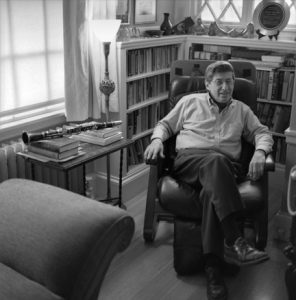Is Today’s 21st Century Burnout 19th Century’s Neurasthenia?
by Don Lipsitt, MD
Abstract
This essay addresses the relevance of the concept of “burnout” to concerns about the mental and physical health of today’s physicians and those training to join the medical profession. Comparisons are made with the diagnosis of neurasthenia in the 19th century. Social contributors to and the influence of stress on the phenomena in each instance are presented.
The Journal of Nervous and Mental Disease, 207(9): 773-777, September 2019.
Link to Online Publication [can be requested from the library@bpsi.org]

Don R. Lipsitt, MD, is a member of the Boston Psychoanalytic Society and Institute, a professor of clinical psychiatry at Harvard Medical School and a past president of the International College of Psychosomatic Medicine. The founder of two journals on consultation-liaison psychiatry, he is the recipient of several lifetime achievement awards for contributions to the field and the author of Foundations of Consultation-Liaison Psychiatry: The Bumpy Road to Specialization (Routledge, 2016). The Academy of Psychosomatic Medicine has inaugurated the “Don R. Lipsitt Award for Achievement in Integrated and Collaborative Care.”
Previous Posts:
Elsa Ronningstam, PhD (2020). Internal Processing in Patients with Pathological Narcissism or Narcissistic Personality Disorder: Implications for Alliance Building and Therapeutic Strategies. Journal of Personality Disorders, 34 (Suppl): 80-103.
Dan Jacobs (2019). Three’s a Crowd: Stella’s Pregnancy and the Arrival of an “Other” in A Streetcar Named Desire. International Journal of Applied Psychoanalytic Studies. 16:3, 174– 180.
Fred Busch (2020). The Clinical Significance and Problems of a Traumaticentric View. In Trauma and the Destructive-Transformative Struggle: Clinical Perspectives, edited by Terrence McBride and Maureen Murphy. Routledge, p. 187-194.
Jeremy P. Nahum (2019). Louis Sander: Remembrances and Reflections on His Contributions.
James M. Herzog (2019). “Polarity, Paradox and the Organizing Process in Development”; Parent-Infant Psychotherapy and Child Analytic Technique: In Honor of Louis Sander. Psychoanalytic Inquiry, 39:1, 98-108.
Lora Heims Tessman, PhD (2019). Momentums of Meeting. Psychoanalytic Inquiry, 39 (1): 88-97.
Jane Hanenberg, EdD (2019). Review of the book Demons in the Consulting Room: Echoes of Genocide, Slavery and Extreme Trauma in Psychoanalytic Practice ed. by Adrienne Harris, Margery Kalb, and Susan Klebanoff. American Imago 76(2), 274-278.
Paola M. Contreras, PsyD (2019). Working with the Human Trafficking Survivor: What Counselors, Psychologists, Social Workers and Medical Professionals Need to Know. In Working with the Human Trafficking Survivor: What Counselors, Psychologists, Social Workers and Medical Professionals Need to Know, edited by Mary C. Burke. Routledge, pp. 61-80.
Rodrigo Barahona, PsyaD (2019). Unlaid Ghosts: A Discussion Of Maria Grazia Oldoini’s “Abusive Relations and Traumatic Development: Marginal Notes on a Clinical Case”. Psychoanalytic Quarterly, 88:2, 277-295.
Sarah L. Lusk, PhD (2019). A Psychoanalytic Approach to the Complexity of Understanding and Treating Patients with ADHD Beyond Childhood: The Experiences of Two Psychoanalytic Candidates. The Psychoanalytic Study of the Child, 72:1, 61-70.
Anthony D. Bram, PhD, ABAP, FABP (2019). The Subjective Impact of Separation and Divorce on a Latency-Aged Child and His Analysis. Psychoanalytic Study of the Child, 72:24-32.
Anna Ornstein, MD (2019). Six Million and One: a documentary. In Cinematic Reflections on the Legacy of the Holocaust: Psychoanalytic Perspectives, edited by Diana Diamond and Bruce Sklarew. Routledge, p. 40-50.
Click here to see a full archive of featured papers. All articles can be requested from the library.

